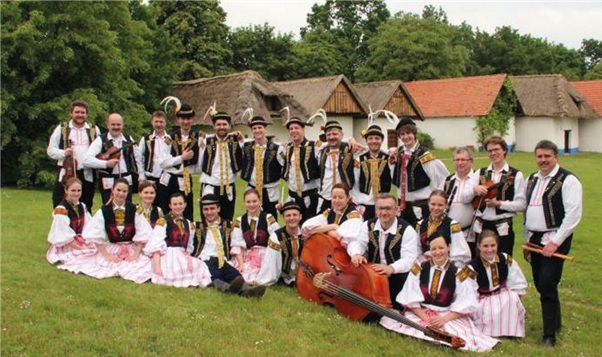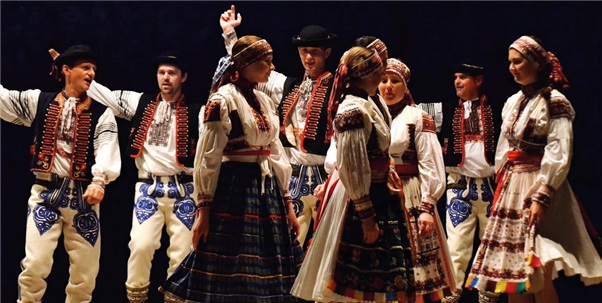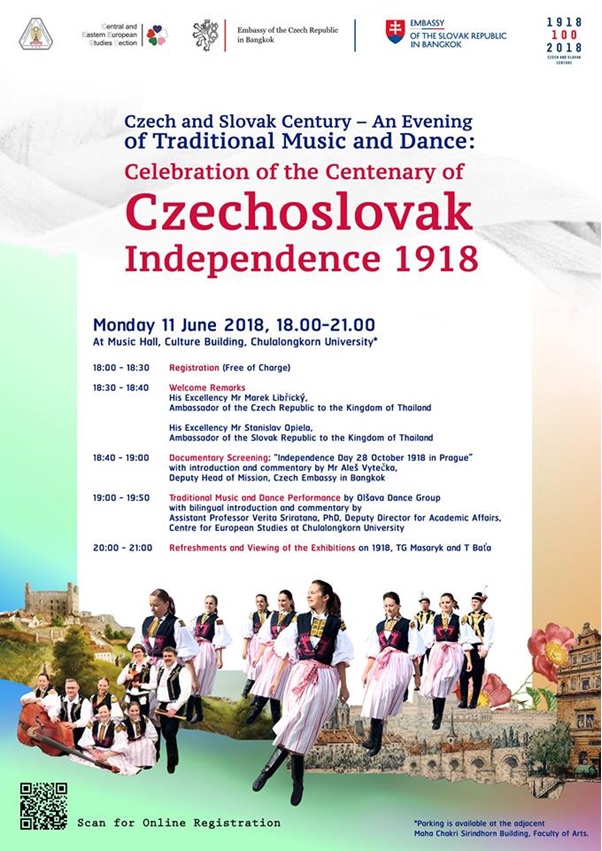Come and join the Celebration of 100 Years of Czechoslovakia at Chulalongkorn University
Look at the map of Europe.
Point your finger somewhere in the middle of the map and you might cover two small countries positioned next to each other. If you have never read anything about Czechia or Slovakia, the first and maybe the only impressions you might have got from these greenish and hilly areas under your finger are: they might be nice destinations for winter sports; alcohol must be cheap; they are not far from Austria; that Prague is actually part of Czech Republic; and, that the you might have passed through Bratislava (capital of Slovakia) while cruising on Danube river. Some people occasionally remembered that these two countries were joined together before the 1989, and, well, some still believe that they have never separated.
Everywhere I travelled, I met people who had never heard about a region called Central Europe, not to mention the Czech Republic and the Slovak Republic. It made me sad, as this region is where I come from and call home. I somehow belong to both countries. I still remember the time when I was searching the drawers at my home and found my old birth certificate. I was maybe 16 years old when I realised that I was a part of a transitioning generation of young people who were born before the dissolution of Czecho-Slovakia (01. 01. 1993). It was a strange feeling, realising that I was two years older than the young country I was currently living in after the velvet divorce.

Those 25 years of independent existence of these two countries have not been easy. They needed to --and they still are learning how to-- work on their democracy, which was so hardly earned after the fall of Berlin Wall in 1989. After struggling with difficult period between the years 1938-1989 when any future direction to liberal forms of government were shut down by oppressive regimes, the Czechs and Slovaks are still learning the hard lesson that, although democracy is hard to achieve, it is even harder to maintain. It is a constant never-ending work and fight, but a work which pays off in a longer term and is safer than anything these countries experienced in the past.
As one country, they survived two totalitarian regimes. One was under the rule of Nazi Germany during the Second World War (1938-1945) which separated their first attempt to be a united fully functioning democratic country (period of 1st Czechoslovakia, 1918-1938). The Second World War exposed some silent and existing problems the country had in its fresh start. Such inherent conflict was exploited by Adolf Hitler, who brought the country into a crisis. For the short period of time of the war the Czech part was annexed by Reich and Slovak part controlled as a puppet state. Nevertheless, the differences were overcome and as the second Czecho-Slovakia resumed its existence after the WWII, it was destined to fall into yet another exploitative hands of the Communist Party in 1948, as it was a part of the Eastern bloc formed and controlled by the USSR. People who can describe USSR and Warsaw Pact country tanks and soldiers during the Prague Spring of 1968 approaching Prague, are still healthy and very well alive to tell you about the fears they have felt in the moments of the occupation. Those pictures are still vivid in their minds, with imagination dutifully fed by their own parents and grandparents who lived in Czechoslovakia or Czecho-Slovakia for the most of their lives.
I hope that it might be less a surprise for you now to understand why the embassies of both countries are trying to celebrate a country which does not exist anymore, the memory of a real imagined nation. The nostalgia felt by Czechs and Slovaks older than myself, of those much older than their own existing countries, is filled by many conflicting feelings. Pride, sadness, happiness, embarrassment, pain, all exist as part of one region, which has a much in common as it has differences.
All of that interesting historical remembrance started somewhere. It is why the commemoration of the independence of the First Czechoslovakia unites all these feelings nostalgia together. Czechoslovakia heading to the unknown 100 years ago was also a period perceived by many as the most democratic and the most hopeful in times when hope was needed so badly.
By this remark, please, let me invite you to an event organised by the Czech and Slovak embassies, which is devoted to this first half of the existence of Czechoslovakia. Please, join us at the Music Hall at the Chulalongkorn University on Monday 11 June 2018 at 18.00 hrs for some educational programme. Watch the folk music and dance performance. Come and talk to the expatriates and ambassadors about anything about this region, the two countries, the imagined real communities, the real imagined communities, the cultures and their histories.
The Czech and Slovak Embassies have decided to introduce you to Czechoslovakia and the region of Central Europe through culture and music, including an exhibition about the First Czechoslovakia. The highlight of the event will be a Folk dance group called Ol?ava from Moravia, yet another living imagined region situated in-between the two countries and carries symbolic meanings of both in their dresses, songs and dances. Tickets are free of charge. This is a public event.
We hope to see you at Chulalongkorn University soon.






